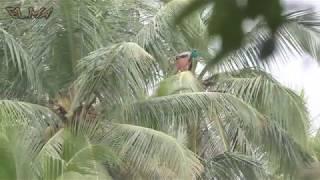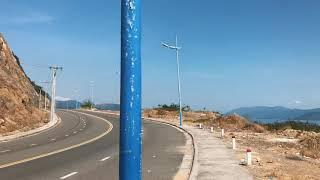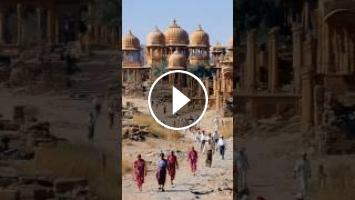Jaisalmer, known as the "Golden City" of India, rises like a mirage from the heart of the Thar Desert in Rajasthan. Built from golden sandstone that glows in the desert sun, Jaisalmer is a place of fortresses, camel caravans, intricate carvings, and endless sand dunes — a living reminder of India’s medieval trade routes and desert kingdoms.
At its heart stands the magnificent Jaisalmer Fort (स्वर्ण क़िला), one of the very few living forts in the world. Unlike most forts that have become museums, Jaisalmer Fort is a thriving community — home to thousands of residents, temples, shops, cafés, and intricately carved havelis. Its massive walls rise directly from Trikuta Hill, glowing amber at sunrise and turning honey-gold at sunset, casting a spell over anyone who walks through its winding alleys.
Inside the fort, the Jain Temples are a marvel of stonework — their walls and pillars carved with such delicate detail that they seem woven from lace. Outside the fort, the town is dotted with havelis (mansions) built by wealthy merchants in the 18th and 19th centuries. The most famous among them, Patwon Ki Haveli, is an ornate five-house complex filled with balconies, lattice screens, and sandstone filigree so fine it almost seems to float.
Beyond the city, the desert beckons. A journey into the Sam Sand Dunes at sunset — whether by jeep, camel, or horseback — is a quintessential Jaisalmer experience. As the sun dips behind the rippling dunes, folk musicians play the sarangi, dancers twirl in traditional Rajasthani skirts, and the desert wind carries centuries of stories across the sands.
Despite its remote location, Jaisalmer is also known for its rich handicrafts, including embroidery, mirror work, leather goods, and silver jewelry — many of which are made by local artisans in desert villages. In the bazaars around Gopa Chowk and Sadar Bazaar, you’ll find these colorful crafts piled high, along with spices, antiques, and textiles fit for a maharaja’s court.
Life here is slower, shaped by the rhythm of heat, wind, and old traditions. Whether you’re sipping chai on a rooftop terrace, attending the lively Jaisalmer Desert Festival, or sleeping under the stars in a desert camp, Jaisalmer offers something more than just beauty — it offers a doorway into Rajasthan’s soul, where the past is never far and the desert sings in gold.
At its heart stands the magnificent Jaisalmer Fort (स्वर्ण क़िला), one of the very few living forts in the world. Unlike most forts that have become museums, Jaisalmer Fort is a thriving community — home to thousands of residents, temples, shops, cafés, and intricately carved havelis. Its massive walls rise directly from Trikuta Hill, glowing amber at sunrise and turning honey-gold at sunset, casting a spell over anyone who walks through its winding alleys.
Inside the fort, the Jain Temples are a marvel of stonework — their walls and pillars carved with such delicate detail that they seem woven from lace. Outside the fort, the town is dotted with havelis (mansions) built by wealthy merchants in the 18th and 19th centuries. The most famous among them, Patwon Ki Haveli, is an ornate five-house complex filled with balconies, lattice screens, and sandstone filigree so fine it almost seems to float.
Beyond the city, the desert beckons. A journey into the Sam Sand Dunes at sunset — whether by jeep, camel, or horseback — is a quintessential Jaisalmer experience. As the sun dips behind the rippling dunes, folk musicians play the sarangi, dancers twirl in traditional Rajasthani skirts, and the desert wind carries centuries of stories across the sands.
Despite its remote location, Jaisalmer is also known for its rich handicrafts, including embroidery, mirror work, leather goods, and silver jewelry — many of which are made by local artisans in desert villages. In the bazaars around Gopa Chowk and Sadar Bazaar, you’ll find these colorful crafts piled high, along with spices, antiques, and textiles fit for a maharaja’s court.
Life here is slower, shaped by the rhythm of heat, wind, and old traditions. Whether you’re sipping chai on a rooftop terrace, attending the lively Jaisalmer Desert Festival, or sleeping under the stars in a desert camp, Jaisalmer offers something more than just beauty — it offers a doorway into Rajasthan’s soul, where the past is never far and the desert sings in gold.













Комментарии